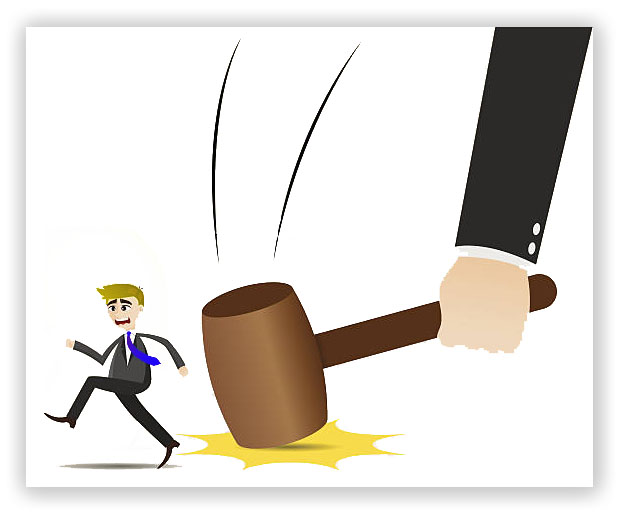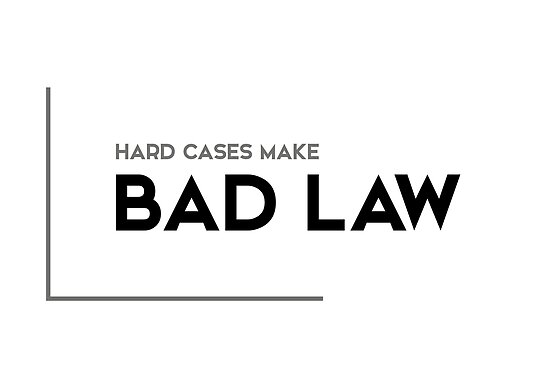We post news and comment on federal criminal justice issues, focused primarily on trial and post-conviction matters, legislative initiatives, and sentencing issues.

‘YOU MUST BE PUNISHED!’
 My daughter Leslie spent a year as a Fulbright Scholar teaching in Vladivostok, Russia (back in the days when Russia still held promise as a member in good standing of the benevolent world order). One evening, she was struck by a car whose driver jumped a red light.
My daughter Leslie spent a year as a Fulbright Scholar teaching in Vladivostok, Russia (back in the days when Russia still held promise as a member in good standing of the benevolent world order). One evening, she was struck by a car whose driver jumped a red light.
It was the kind of automotive negligence that happens the world over, and the driver and his wife were appalled and chagrinned by the mishap, even bundling her into the car and driving her to an emergency room (she suffered a broken leg but nothing worse). Still, the next day, as Leslie lay recuperating in the hospital, her Russian friends urged her to file a police report.
Leslie resisted, because it was a cinch that the driver’s insurance – if he had any – would not begin to pay for the treatment she would need back in the USA (she had to fly home for about six weeks for the reconstruction that her knee required). She hardly saw the point in the paperwork a police report would require. But her Russian friends insisted, arguing, “He must be punished!”
Alas, the societal demand for retribution is hardly limited to Putin’s paradise, as the 10th Circuit reminded us last week.
After Donald Joe Booker, Jr. repeatedly violated the terms of his supervised release, the district court revoked his supervision and sentenced him to 24 months in prison, the maximum time he could get under the statute.
 To be sure, Donnie was 87 miles of bad track: While on supervised release after serving his sentence for being a felon in possession of a gun, Donnie was caught for speeding, driving without a license or insurance, and refusing to submit to sobriety testing. He tested positive for amphetamine or methamphetamine use on four separate occasions (and had some meth in his pocket when he was arrested on the revocation warrant), left the Eastern District of Oklahoma without permission on three occasions, failed to tell his probation officer about contacts with law enforcement on three occasions, and failed to appear for drug testing on five separate occasions.
To be sure, Donnie was 87 miles of bad track: While on supervised release after serving his sentence for being a felon in possession of a gun, Donnie was caught for speeding, driving without a license or insurance, and refusing to submit to sobriety testing. He tested positive for amphetamine or methamphetamine use on four separate occasions (and had some meth in his pocket when he was arrested on the revocation warrant), left the Eastern District of Oklahoma without permission on three occasions, failed to tell his probation officer about contacts with law enforcement on three occasions, and failed to appear for drug testing on five separate occasions.
When he was sentenced on the supervised release violation, the district court complained that Donnie “has shown repeated disregard for rules and condition of his supervised release. He has continued to commit new law violations and he has illegally possessed controlled substances, which he acknowledges. He has on multiple occasions failed to report to his law enforcement contact as required by the conditions of his supervision and he has also traveled outside the district of supervision without permission of his probation officer. Based upon these factors, a sentence outside the advisory guideline range is necessary to serve as an adequate deterrent to this defendant as well as others, promote respect for the law, and provide just punishment for the offense, and provide protection for the public.”
Last week, the 10th Circuit vacated Donnie’s sentence.
 Hard cases make bad law. The catch is that when sentencing someone for a criminal offense, the judge must consider the sentencing factors listed in 18 USC § 3553(a), which is a weighty list that includes just punishment for the offense, the need to protect the public, deterrence and the promoting respect for the law.
Hard cases make bad law. The catch is that when sentencing someone for a criminal offense, the judge must consider the sentencing factors listed in 18 USC § 3553(a), which is a weighty list that includes just punishment for the offense, the need to protect the public, deterrence and the promoting respect for the law.
When sentencing someone who screwed up and violated their supervised release – a term which is imposed to run after release from imprisonment – the district court is required to consider only some of the § 3553(a) sentencing factors, not all of them. Under 18 USC § 3583(e), which governs revocation of supervised release , the court must sentence “after considering the factors set forth in section 3553(a)(1), (a)(2)(B), (a)(2)(C), (a)(2)(D), (a)(4), (a)(5), (a)(6), and (a)(7).”
“Notably absent from this list,” the 10th noted, “is § 3553(a)(2)(A), which directs courts to consider… the need for the sentence imposed… to reflect the seriousness of the offense, to promote respect for the law, and to provide just punishment for the offense.”
The Circuit held that “section 3553(a)(2)(A) represents ‘retribution,’ one of the ‘four purposes of sentencing’ that courts must consider when fashioning a sentence during the initial sentencing process.” Here, the district court justified Donnie’s 24-month… “in part as ‘necessary to serve as an adequate deterrent to this defendant as well as others, promote respect for the law, and provide just punishment for the offense, and provide protection for the public.’ By referencing the need to ‘promote respect for the law, and provide just punishment for the offense,’ the district court quoted from § 3553(a)(2)(A), the omitted factor.”
Two weeks ago, the Congressional Research Service issued one of its “Legal Sidebar” reports on supervised release sentencing, in which it noted a deep circuit split on whether retribution may play a role in sentencing on revocation of supervised release. “On one side of the divide,” the report stated, “the U.S. Courts of Appeals for the First, Second, Third, Sixth, and Seventh Circuits have held that federal courts may consider retribution in making revocation decisions. On the other side, the Fourth, Fifth, and Ninth Circuits have concluded that courts either may not consider retribution in these decisions at all or may consider it only to a limited degree.”
To the “nays” you can now add the 10th Circuit.
 We’re not just counting angels on the head of a pin, either. Writing in his Sentencing Law and Policy blog, Ohio State University law professor Doug Berman observed that “given U.S. Sentencing Commission data showing over 20,000 supervised release violation hearings taking place every year, there are on average nearly 100 federal defendants at least potentially impacted by this jurisprudential divide every single day in federal courts. SCOTUS really should resolve this matter sooner rather than later if we think some semblance of equal justice is of importance in our federal criminal sentencing systems.
We’re not just counting angels on the head of a pin, either. Writing in his Sentencing Law and Policy blog, Ohio State University law professor Doug Berman observed that “given U.S. Sentencing Commission data showing over 20,000 supervised release violation hearings taking place every year, there are on average nearly 100 federal defendants at least potentially impacted by this jurisprudential divide every single day in federal courts. SCOTUS really should resolve this matter sooner rather than later if we think some semblance of equal justice is of importance in our federal criminal sentencing systems.
United States v. Booker, Case No. 22-7000, 2023 U.S. App. LEXIS 7312 (10th Cir. March 28, 2023)
Congressional Research Service, Can Retribution Justify the Revocation of Supervised Release? Courts Disagree (March 13, 2023)
Sentencing Law and Policy, Tenth Circuit deepens split over considering retribution in revocation of federal supervised release (March 29, 2023)
– Thomas L. Root

